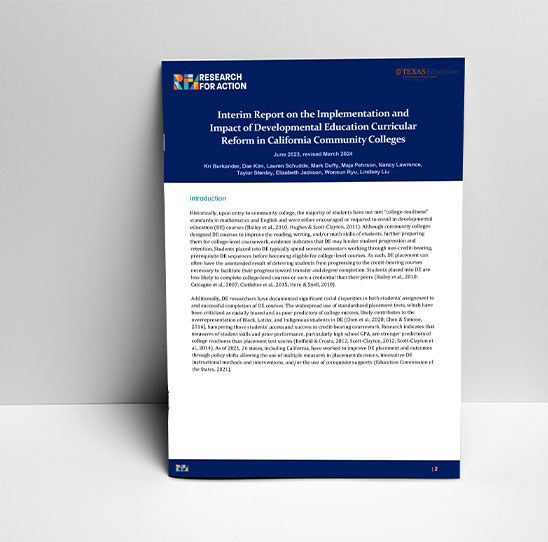This interim report examines the impact of Assembly Bill 705, a California law that reformed developmental education (DE) in community colleges. The law aimed to increase student success by reducing reliance on placement tests and encouraging direct enrollment in transfer-level courses.
To understand how this reform works, we also created a Theory of Change (see Figure 1). First, we recognize the problem: Traditional placement tests often unfairly disadvantaged students of color. This is a form of systemic racism within the education system.
Then, we look at the solution: AB 705 aimed to fix this by changing how colleges place students in courses.
But it’s not that simple: Several factors can influence how well these reforms work. These include:
- How well the college is equipped to implement the changes (institutional capacity).
- Student characteristics and the challenges they face outside of school.
- How the college actually puts the reforms into practice.
- Whether faculty, counselors, and administrators support the changes.
This Theory of Change helps us understand the big picture and how different factors can impact the success of these reforms.
Key Findings:
- Increased Access: AB 705 has led to a significant increase in student enrollment in transfer-level math and English courses.
- Mixed Results on Completion: While enrollment has increased, completion rates in these courses have shown slight declines.
- Persistent Equity Gaps: Black and Latino students continue to experience lower completion rates compared to their white and Asian peers.
- Implementation Challenges: Colleges face challenges in implementing the reforms, including faculty buy-in and providing adequate student support.
- Data Limitations: Obtaining accurate and reliable data on student outcomes within the prison system presents significant challenges.
Recommendations:
- Enhance Student Support: Colleges need to provide robust support systems, such as tutoring and counseling, to help students succeed in transfer-level courses.
- Invest in Faculty Development: Ongoing professional development is crucial to equip faculty with the skills to effectively teach and support diverse student populations in transfer-level courses.
- Address Equity Gaps: Targeted interventions are needed to address the persistent equity gaps experienced by Black and Latinx students.
- Improve Data Collection: Better data collection methods are needed to accurately track student progress and identify areas for improvement.
- Increase Student Awareness: Colleges must effectively communicate information about curricular reforms to students to ensure they understand their options and available support.
The report underscores the importance of ongoing monitoring and evaluation to ensure that reforms are effectively meeting the needs of all students, particularly those from historically marginalized backgrounds. It emphasizes the need for a continued focus on equity and access to ensure that all students have the opportunity to succeed in higher education.

